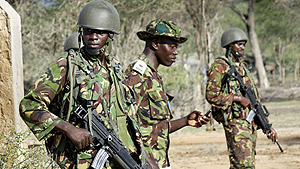Kenya’s military has dismissed as untrue a report by the U.S.-based human rights group which accused its soldiers of committing widespread rights abuses against ethnic Somalis in the northern frontier.


Kenya’s military has dismissed as untrue a report by the U.S.-based human rights group which accused its soldiers of committing widespread rights abuses against ethnic Somalis in the northern frontier. Kenya Defence Force (KDF) spokesman Major Emmanuel Chirchir said the soldiers who crossed over to Somalia in October last year to crack down on members of the Al-Shabaab did not beat, rape, sexually assault or carry out any kind of mistreatment on Kenyan citizens and Somali refugees as alleged by the Human Rights Watch (HRW). "KDF has gone through the HRW report. Some of the incidents documented in the report are not true as reflected. However, we will investigate them to ascertain the truth,” Chirchir told Xinhua by telephone on Saturday. In its 65-page report which was released in Nairobi on Friday, HRW said the Kenyan police and soldiers arbitrarily arrested and mistreated Kenyan citizens and Somali refugees in north-eastern province in response to attacks by militants suspected of links to Somalia’s armed movement Al-Shabaab. The report’s author Neela Ghoshal told journalists in Nairobi that the reprisals against ethnic Somalis have contributed to increased mistrust of the security forces by north-eastern province residents, who told HRW that on a number of occasions since independence, the Kenyan security forces have abused ethnic Somalis with impunity. "Our particular concern which we have documented in this report is the response to those attacks by the security forces,” said Ghoshal. Ghoshal said most serious abuses were carried out by police in the Dadaab camps, which house over 460,000 refugees, most of them Somali. She added that after several explosive attacks that resulted in the death of two Administration Police officers, police carried out an organized, retaliatory raid on refugees. "Rather than doing what they ought to do which is to investigate...what has happened instead is arbitrary round up of residence,” she said.But Chirchir said some of the abuses referred to by the rights group took place when a series of grenade attacks took place in the northern region, adding that the security operation was being carried out by the police and not the military. "Our soldiers only removed the residents from kiosks where Al- Shabaab sympathizers used to carry out grenade and landmine attacks which killed some of our soldiers and the police. This was based on agreement but not force,” Chirchir said. He said the soldiers who were deployed at the border with Somalia to prevent Al-Shabaab from entering the east African nation performed their routine duty of protecting the border from infiltration by Al-Shabaab and did not engage in any security operation which was the work of the police. The explosive attacks appeared to be in response to Kenya’s military intervention in Somalia, Operation Linda Nchi (protect the country) which began in October with the deployment of several thousand Kenyan troops to areas controlled by Al-Shabaab. In February, Kenyan troops joined the African Union Mission in Somalia (AMISOM), a peacekeeping force established to protect Somalia’s weak Transitional Federal Government, which Al-Shabaab is battling.




